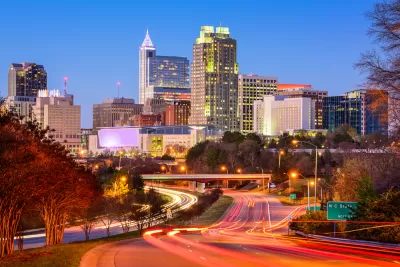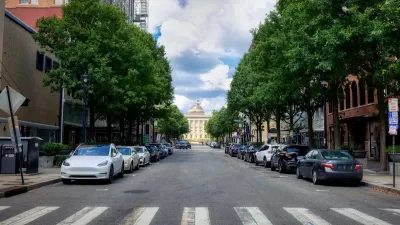The North Carolina capital is reinventing itself as a research and tech hub, attracting major employers and investment along the way.

Writing for the Commercial Observer, Celia Young reports on Raleigh, North Carolina’s explosive growth. “With high-rises sprouting throughout Raleigh’s downtown and Warehouse District, startup hubs and lab conversions transforming neighboring Durham’s former tobacco warehouses, and a burgeoning life sciences sector becoming a bigger national player amid a race for lab space, the Triangle is a ‘supernova,’ according to the latest Urban Land Institute (ULI) Emerging Trends report.”
According to Young, “The region has attracted 44,000 new jobs since the pandemic, just behind Austin and Nashville, with Wake County, where Raleigh’s located, welcoming just over 62 people a day last year.” As Young writes, “While it’s not surprising for a midsize metro in the Southeast and Sun Belt to take strides in today’s commercial real estate market, Raleigh-Durham tops peers with high educational attainment and high income in relation to housing and office costs.”
Young traces the history of Raleigh’s development as a research and tech hub. “Raleigh’s development boom, like so many things in the region, can trace part of its success back to the formation of Research Triangle Park (RTP) in 1959. A collaboration between the region’s academic powerhouses — Duke University in Durham, State University in Raleigh, and the University of North Carolina in Chapel Hill — the 7,000-acre site became a magnet for tech.”
Young points to the city’s willingness to change its zoning code as one component of its rapid growth. “Combined with the city’s Unified Development Ordinance, which consolidates zoning and other planning regulations, Raleigh’s growth policies make it relatively easy to build, and build fast, especially compared to more established markets.” Similar growth is happening in other parts of the state, which is making a concerted push to woo major companies.
FULL STORY: Raleigh Development Boom Rides Life Sciences, Tech Interest

Planetizen Federal Action Tracker
A weekly monitor of how Trump’s orders and actions are impacting planners and planning in America.

San Francisco's School District Spent $105M To Build Affordable Housing for Teachers — And That's Just the Beginning
SFUSD joins a growing list of school districts using their land holdings to address housing affordability challenges faced by their own employees.

The Tiny, Adorable $7,000 Car Turning Japan Onto EVs
The single seat Mibot charges from a regular plug as quickly as an iPad, and is about half the price of an average EV.

With Protected Lanes, 460% More People Commute by Bike
For those needing more ammo, more data proving what we already knew is here.

In More Metros Than You’d Think, Suburbs are Now More Expensive Than the City
If you're moving to the burbs to save on square footage, data shows you should think again.

The States Losing Rural Delivery Rooms at an Alarming Pace
In some states, as few as 9% of rural hospitals still deliver babies. As a result, rising pre-term births, no adequate pre-term care and "harrowing" close calls are a growing reality.
Urban Design for Planners 1: Software Tools
This six-course series explores essential urban design concepts using open source software and equips planners with the tools they need to participate fully in the urban design process.
Planning for Universal Design
Learn the tools for implementing Universal Design in planning regulations.
Smith Gee Studio
City of Charlotte
City of Camden Redevelopment Agency
City of Astoria
Transportation Research & Education Center (TREC) at Portland State University
US High Speed Rail Association
City of Camden Redevelopment Agency
Municipality of Princeton (NJ)





























